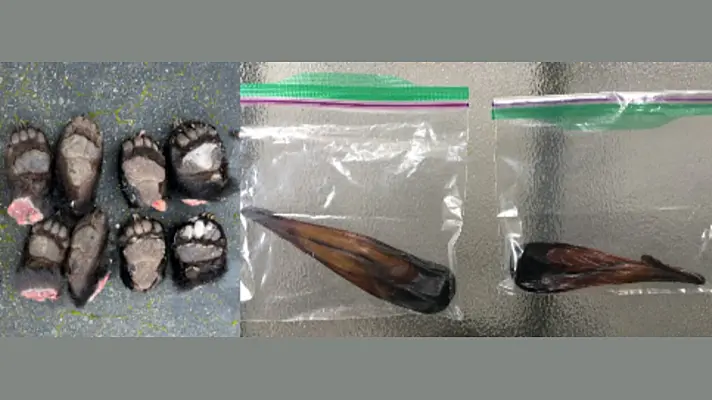OLYMPIA, WA – A Skagit County woman has been sentenced following a Washington Department of Fish and Wildlife (WDFW) Police investigation into the illegal trafficking of black bear parts.
Yan L. Li, 54, pleaded guilty in Skagit County Superior Court to one Class C felony count of unlawful wildlife trafficking. On Aug. 25, she was sentenced to 45 days of home confinement and ordered to pay an $1,800 fine.
The case began in 2020 when the Skagit County Health Department alerted WDFW officers after residents reported possible restaurant health code violations involving deceased waterfowl found outside Li’s restaurant. While WDFW confirmed the birds were not being sold through the business, Li was cited for possession of wildlife without proper documentation and fined.
In 2021, additional complaints prompted WDFW Police to launch a deeper investigation. Undercover officers later sold Li black bear parts—including 13 gall bladders, six livers, and 24 paws—as well as illegally purchased waterfowl.
According to WDFW, bear gall bladders can fetch between $100 and $200 locally, but are sold for thousands of dollars in overseas markets, driving an underground trade that threatens bear populations.
“The perceived medicinal value creates an increased demand for the species and their body parts, which threaten the long-term survivability of a population by overharvesting,” said WDFW Police Captain Brad Rhoden. “Beyond being illegal, it’s highly concerning to unethically waste black bears, or any wildlife for that matter, for nothing more than a few body parts being sold on the black market.”
Scott Halloran of the Washington State Attorney General’s Office, who prosecuted the case, said the outcome was expected given the strength of the investigation. “There was no doubt a conviction would be given due to the excellent investigation performed by WDFW on this case,” he stated.
The sentencing reflects a collaborative effort between WDFW Police and the Attorney General’s Office Environmental Protection Division as part of Washington’s ongoing effort to combat illegal wildlife trafficking.





